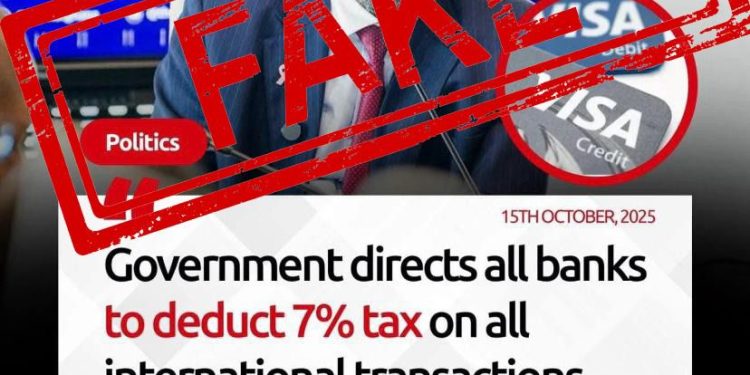- No 7% Tax on Visa and Mastercard Transactions — NorvanReports Investigation Debunks Social-Media Claims
A NorvanReports investigation has found that widely circulated social-media messages claiming a new 7 percent tax on international Visa and Mastercard transactions in Ghana are entirely false.
Checks across Ghana’s financial and regulatory ecosystem, including the Bank of Ghana, show that no such tax exists. All indications confirm that neither banks nor payment-system operators have received any instruction to introduce a levy on cross-border card transactions. Furthermore, the introduction of any new tax in Ghana would, by law, require Parliamentary approval, a process that has not taken place.
NorvanReports’ review of transaction structures within the banking industry shows that what may have triggered the confusion are standard international card-processing fees, not taxes. These include routine charges such as the Optional Issuance Fee (OIF) and other settlement-related costs applied globally by banks and card networks. Such fees are designed to cover the cost of acquiring, processing, and reconciling payments made in foreign currencies.
These charges are commercial in nature and accrue to financial institutions and international payment networks, not to the Government of Ghana. They are part of long-standing international practice governing card-based settlements and have no connection to domestic tax policy or fiscal reforms.
The rapid spread of the fabricated claim underscores the growing risk of financial misinformation in an increasingly digital economy. With mobile money, e-commerce, and cross-border payments expanding rapidly, inaccurate information about fees or taxes can easily unsettle consumers and distort confidence in the financial system.
Market observers tell NorvanReports that the timing of the rumour—amid public conversations about tax reforms and cost-of-living pressures—may have amplified its reach. Analysts warn that unchecked misinformation of this kind could erode trust in the banking and payments sector just as Ghana deepens its transition toward a cash-lite economy.
NorvanReports’ monitoring confirms that Ghana’s financial institutions continue to process international card transactions under normal conditions with no new levies applied. Consumers are therefore advised to verify information about taxes, banking fees, and payment policies through credible financial channels and established news outlets rather than social-media forwards.
As part of its public-interest mandate, NorvanReports will continue to track and fact-check claims affecting Ghana’s financial system to promote transparency, stability, and informed public discourse.








